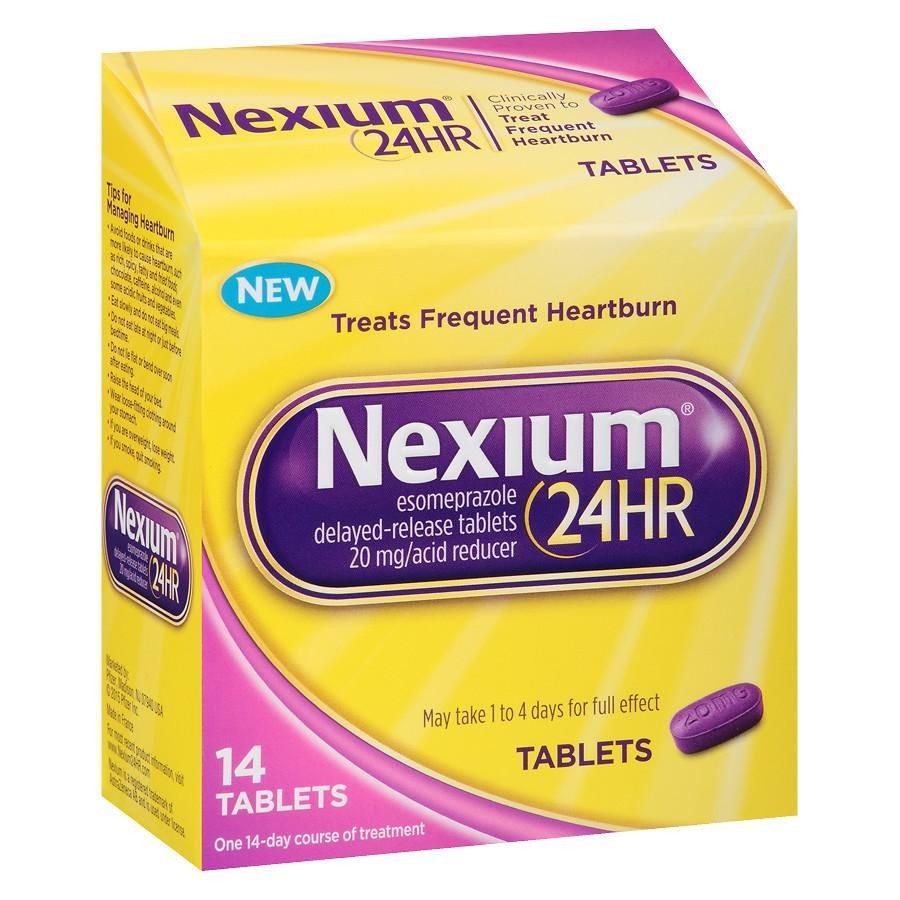
esomeprazole delayed-release capsule – oral, Nexium
Medication Uses How To Use Side Effects Precautions Drug Interactions Overdose Notes Missed Dose Storage USES: Esomeprazole is used to treat certain stomach and esophagus problems (such as acid reflux, ulcers). It works by decreasing the amount of acid your stomach makes. It relieves symptoms such as heartburn, difficulty swallowing, and persistent cough. This medication helps heal acid damage to the stomach and esophagus, helps prevent ulcers, and may help prevent cancer of the esophagus. Esomeprazole belongs to a class of drugs known as proton pump inhibitors (PPIs).
HOW TO USE: Read the Medication Guide and the Patient Information Leaflet if available from your pharmacist before you start taking esomeprazole and each time you get a refill. If you have any questions, ask your doctor or pharmacist.Take this medication by mouth as directed by your doctor, usually once daily, at least 1 hour before a meal. Dosage and length of treatment are based on your medical condition and response to treatment.Do not crush or chew this medication. Swallow the capsules whole. If you have difficulty swallowing this medication whole, you may open the capsule and sprinkle the contents into a tablespoon of unheated applesauce. Swallow the applesauce mixture right away without chewing it. Do not prepare the mixture ahead of time for later use. Doing so may destroy the drug.If needed, antacids may be taken along with this medication. If you are also taking sucralfate, take esomeprazole at least 30 minutes before sucralfate.Use this medication regularly to get the most benefit from it. To help you remember, take it at the same time each day. Continue to take this medication for the prescribed length of treatment even if you are feeling better.Tell your doctor if your condition persists or worsens.
SIDE EFFECTS: See also Precautions section.Headache or abdominal pain may occur. If any of these effects persist or worsen, tell your doctor or pharmacist promptly.Remember that your doctor has prescribed this medication because he or she has judged that the benefit to you is greater than the risk of side effects. Many people using this medication do not have serious side effects.Tell your doctor right away if you have any serious side effects, including: symptoms of a low magnesium blood level (such as unusually fast/slow/irregular heartbeat, persistent muscle spasms, seizures).This medication may rarely cause a severe intestinal condition (Clostridium difficile-associated diarrhea) due to a type of bacteria. Do not use anti-diarrhea products or narcotic pain medications if you have any of the following symptoms because these products may make them worse. Tell your doctor right away if you develop: persistent diarrhea, abdominal or stomach pain/cramping, fever, blood/mucus in your stool.A very serious allergic reaction to this drug is rare. However, get medical help right away if you notice any symptoms of a serious allergic reaction, including: rash, itching/swelling (especially of the face/tongue/throat), severe dizziness, trouble breathing.This is not a complete list of possible side effects. If you notice other effects not listed above, contact your doctor or pharmacist.In the US -Call your doctor for medical advice about side effects. You may report side effects to FDA at 1-800-FDA-1088.In Canada – Call your doctor for medical advice about side effects. You may report side effects to Health Canada at 1-866-234-2345.
PRECAUTIONS: Before taking esomeprazole, tell your doctor or pharmacist if you are allergic to it; or to other PPIs (such as lansoprazole, omeprazole); or if you have any other allergies. This product may contain inactive ingredients, which can cause allergic reactions or other problems. Talk to your pharmacist for more details.Before using this medication, tell your doctor or pharmacist your medical history, especially of: liver disease.Some symptoms may actually be signs of a more serious condition. Get medical help right away if you have: heartburn with lightheadedness/sweating/dizziness, chest/jaw/arm/shoulder pain (especially with shortness of breath, unusual sweating), unexplained weight loss.Proton pump inhibitors (such as esomeprazole) may increase your risk for bone fractures, especially with longer use, higher doses, and in older adults. Talk with your doctor or pharmacist about ways to prevent bone loss/fracture, such as by taking calcium (such as calcium citrate) and vitamin D supplements.Children may be more sensitive to the side effects of this drug, especially fever, cough, and infections of the nose/throat/airways.Before having surgery, tell your doctor or dentist about all the products you use (including prescription drugs, nonprescription drugs, and herbal products).During pregnancy, this medication should be used only when clearly needed. Discuss the risks and benefits with your doctor.It is unknown if this medication passes into breast milk. However, similar drugs pass into breast milk. The effects on a nursing infant are unknown. Consult your doctor before breast-feeding. DRUG INTERACTIONS: See also How to Use section.Drug interactions may change how your medications work or increase your risk for serious side effects. This document does not contain all possible drug interactions. Keep a list of all the products you use (including prescription/nonprescription drugs and herbal products) and share it with your doctor and pharmacist. Do not start, stop, or change the dosage of any medicines without your doctor’s approval.Some products that may interact with this drug include: cilostazol, clopidogrel, methotrexate (especially high-dose treatment), rifampin, St John’s wort.Some products need stomach acid so that the body can absorb them properly. Esomeprazole decreases stomach acid, so it may change how well these products work. Some affected products include atazanavir, erlotinib, nelfinavir, rilpivirine, certain azole antifungals (itraconazole, ketoconazole, posaconazole), among others.Esomeprazole is very similar to omeprazole. Do not use any medications containing omeprazole while using esomeprazole.This medication may interfere with certain laboratory tests, possibly causing false test results. Make sure laboratory personnel and all your doctors know you use this drug. OVERDOSE: If overdose is suspected, contact a poison control center or emergency room immediately. US residents can call their local poison control center at 1-800-222-1222. Canada residents can call a provincial poison control center. Symptoms of overdose may include: confusion, extreme sweating, blurred vision, or unusually fast heartbeat.
QUESTION
NOTES: Do not share this medication with others.If your doctor instructs you to use this medication regularly for a long time, laboratory and medical tests (such as a magnesium blood test) may be performed periodically to monitor your progress or check for side effects. Keep all regular medical and laboratory appointments. MISSED DOSE: If you miss a dose, take it as soon as you remember. If it is near the time of the next dose, skip the missed dose and resume your usual dosing schedule. Do not double the dose to catch up. STORAGE: Store at room temperature away from moisture. Do not store in the bathroom. Keep all medications away from children and pets.Do not flush medications down the toilet or pour them into a drain unless instructed to do so. Properly discard this product when it is expired or no longer needed. Consult your pharmacist or local waste disposal company. Information last revised March 2014. Copyright(c) 2014 First Databank, Inc.
Report Problems to the Food and Drug Administration
You are encouraged to report negative side effects of prescription drugs to the FDA. Visit the FDA MedWatch website or call 1-800-FDA-1088.
Selected from data included with permission and copyrighted by First Databank, Inc. This copyrighted material has been downloaded from a licensed data provider and is not for distribution, except as may be authorized by the applicable terms of use.
CONDITIONS OF USE: The information in this database is intended to supplement, not substitute for, the expertise and judgment of healthcare professionals. The information is not intended to cover all possible uses, directions, precautions, drug interactions or adverse effects, nor should it be construed to indicate that use of particular drug is safe, appropriate or effective for you or anyone else. A healthcare professional should be consulted before taking any drug, changing any diet or commencing or discontinuing any course of treatment.


